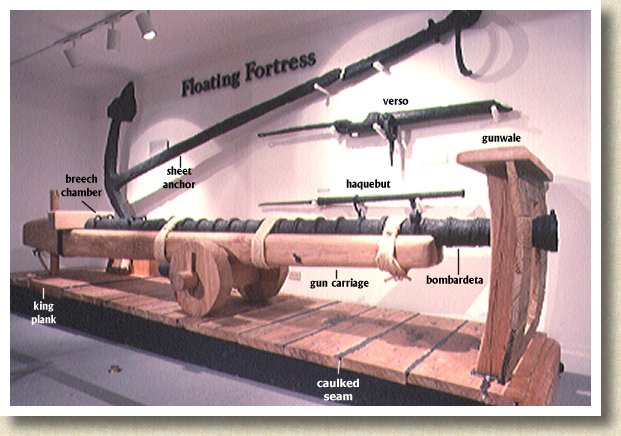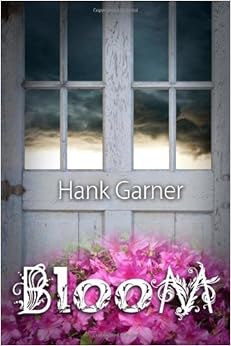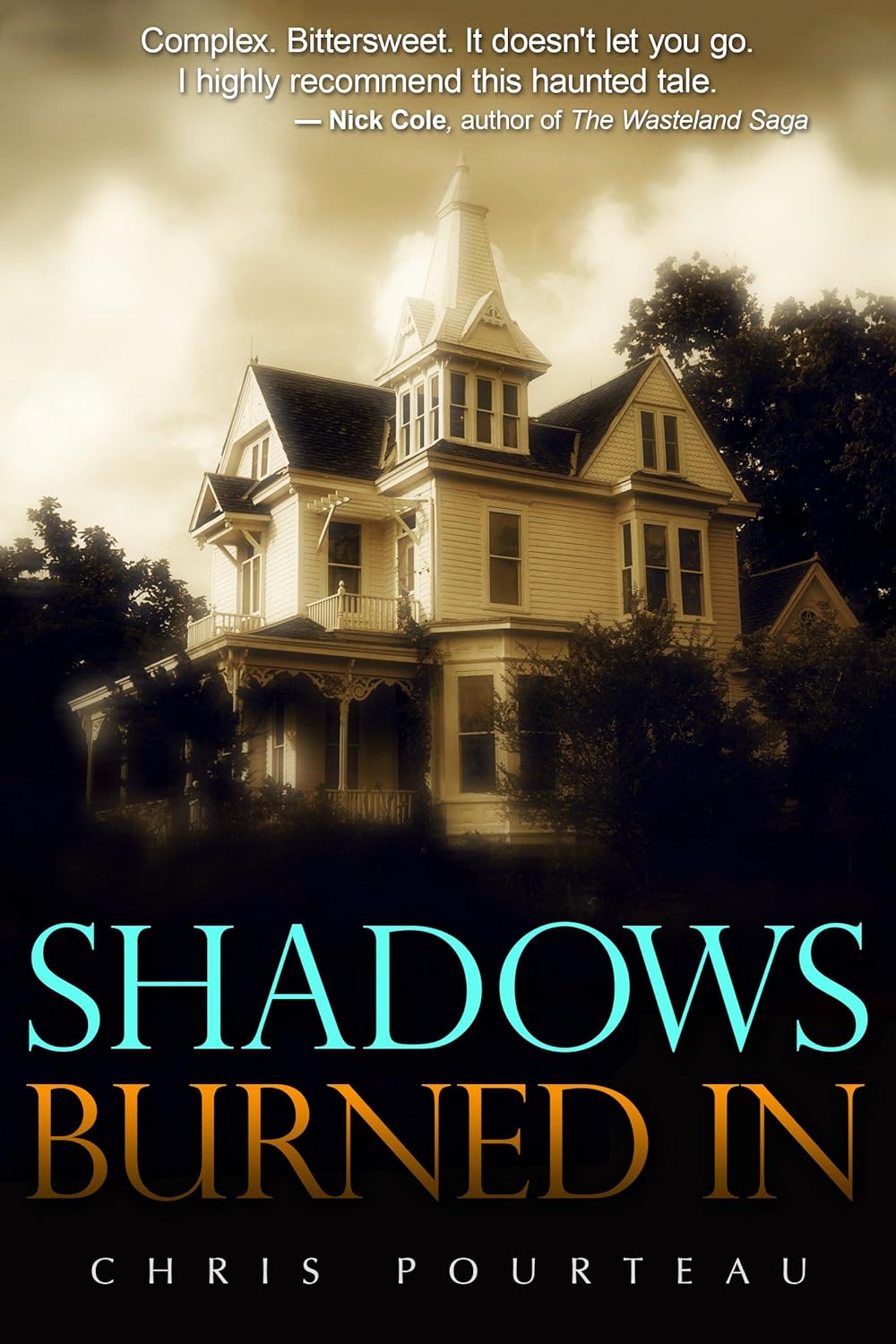One of the best things of being an indie author is to meet other indie authors. If you've followed my interviews for the past few months you've seen that I've met a lot of great authors who write in different genres, styles, formats, but they all have one thing in common: they are passionate and enthusiastic about what they do.
One such author is
Chris Pourteau, who, as he introduces himself in his bio,
has made a living at one time or another as a teacher, a lab technician helping to recover one of Christopher Columbus’s ships, and a technical writer and editor. Shadows Burned In is his first foray into the world of long fiction.
I met Chris over a long chat about viruses (look out for his forthcoming book
The Serenity Strain!), but I was so intrigued by the Columbus's ship story that I knew I had to find out more. So I'm thrilled to have Chris as my guest on the blog today!
EEG:
Welcome, Chris! Tell us a bit more about your "past life" as a lab technician in particular: what kind of lab where you working at and did this inspire any of your stories?
CP: When I was a junior-senior in college, I worked part-time as a student lab technician. This would’ve been 1989–1990. Texas A&M University is home to the Institute of Nautical Archaeology (or INA). Our job at the lab was to recover artifacts from the
Molasses Reef Wreck in the Turks and Caicos Islands. It was actually one of
Christopher Columbus's ships from one of his voyages to the new world. Not one of the famous ones though! By the time I came on board the project, all the concretions (underwater rock formations with artifacts inside) had been brought to A&M for recovery. I became really good friends with my fellow student techs, and most of them I’m still close friends with today. It was a GREAT experience! The “lab” was actually an old fire station located on a repurposed air base near A&M. It was hot in the summer but a great job for a student, especially one who loves history like I do.
My job was to use an air drill to chip away the concretion without harming the artifacts inside. We’d place a concretion on a big sheet of Mylar, outline it, then use orthographic projection to show were artifacts were located in the concretion as we chipped away at it. That way you got a permanent map of how the artifacts had been arranged inside the concretion after you’ve broken it apart and fished the artifacts out. Most of the iron artifacts were gray jelly by the time we got to them, but because the rock had formed around them, they left impressions. Even though the artifact might be jelly, if you cut carefully enough, you could preserve a block of concretion that you could then use to cast a replica of the artifact that had been inside it.
I must’ve gotten the ship’s toolbox because I worked for a year on one concretion that was almost nothing but fasteners! (We’d call them nails now.) I used to joke that I was recovering where the toolbox fell over. ;-) My best day on the job—particularly after finding all those nails!—was when I chipped away some rock and found something shiny, like gold! Turned out to be a brass shoe buckle, but it still had the fleur-de-lis in the corners. And, brass or not, it was head-and-shoulders above finding another fastener!
The sexiest items recovered from the shipwreck were bombards, cannons, and shot. And a HUGE anchor. Once recovered and after treating them for oxidation and rust, the artifacts were boiled in long wax vats to seal the air pockets and preserve them against any further corrosion. I believe they’re now on display in the Turks and Caicos Islands in a museum. (You have to say those last three words in Harrison Ford’s voice from Last Crusade to get the full effect.)
 |
| © www.shipsofdiscovery.org |
In the above picture you can see the actual artifacts, including that anchor!
EEG:
How cool! You make my job look so boring. :-)
I really enjoyed your interview with Hank Garner (Hank is a fellow author who started a series of podcast interviews, I'll be talking about that more in another post), and my favorite part is when you talk about how cooperative, friendly and mutually helpful you've found the community of indie authors to be. I couldn't agree more. Can you summarize here, too, what you love about indie publishing that traditional publishing would never give you?
CP: I guess I had my first experience with traditional publishing when I was 19. I got my first agent then—and while that sounds like I’m trying to impress someone, trust me, I’m not!—and two more after that (so that tells you how those business relationships went). Despite three agents between about 1985 and 1992 or so, I had no success finding a home for my fiction. My experience was that the industry didn’t really care about authors, it cared about making money—which I get from a business standpoint. But authors were/are the grist for that mill. For example—and I don’t know if it’s still this way, though I suspect it is—in the Writer’s Market and its spin-off, the Guide to Editors and Literary Agents, writers are advised NOT to submit to multiple agents simultaneously. It’s considered gauche. What’s really happening is that agents don’t want to waste their time reading a pitch someone else might’ve bought a few days earlier. OK, I get that; who wants to waste their time? But agents can take months to respond. So, Traditional Publishing Industry, you mean you expect me to send one letter out at a time, wait months for a likely rejection (if it comes at all), then send another single letter out to another individual agent? Playing the odds of “rejections before acceptance,” I’d die of old age before I ever got an agent! (For the record, I blanketed submissions. Get over it, agents. My time’s valuable, too.)
By contrast, since getting involved with independent publishing, I’ve found a supportive community of fellow authors and readers who value quality in what they write and read. I admit, at first, I was very reluctant to read self-published authors, much less become one. I’m old enough to know the stigma of vanity press (where you pay a publisher to print your stuff; it’s not called “vanity” press for nothing). The stigma comes from the assumption that, if you have to pay someone to publish your writing, it must not be very good. In a lot of cases, that’s certainly true. In my mind, I considered “independent publishing” as simply a digital version of “vanity press,” even if I wasn’t paying someone (and I was publishing it myself). I know better now! Still, anyone can publish anything they want these days, and a lot of it is what you’d expect: well intentioned but, frankly, not that great.
I decided to take a chance on some independent authors because their book blurbs looked interesting (and at 99 cents or $1.99, they were a cheap chance to take). Specifically, these were Roberto Calas, Edward W. Robertson, Manel Loureiro, and Nick Cole. I was astonished! These guys can write! And they’re independently (i.e., self) published? They taught me that you don’t have to be published by a publishing house to be a good writer. And when I reached out to say hi, they emailed me back. Wow! That’s about as different a model from the detached, “don’t call us, we’ll call you” experience I’d had with traditional publishing as you can get, isn’t it?
Since then, I’ve gotten to know a LOT of my fellow authors—Michael Bunker, Jennifer Ellis, Hank Garner, Sam Peralta, and others—and all have helped me along over the last year as I’ve tried to learn the indie publishing ropes. As have you, Elena! I hardly knew you a week (and that only on Facebook) before you agreed to help me refine my idea for a virus gone wild in The Serenity Strain. It’s that kind of selfless “what can I do to help?” attitude that is such a contrast to my experience with traditional publishing. I feel like I’m a part of a vital community of comrades who get almost as excited when a buddy-writer finds success as when they find success for themselves. It’s AWESOME! It’s the way a community should be, writing-focused or otherwise.
EEG:
I was actually very flattered that you shared your ideas with me. I can't wait to read the book! And I couldn't agree more with you on everything you said. Two agents "only" here and a TON of supposed advice and revision requests from not only agents but also a bunch of acquiring editors. I used to think they knew better because they were experts. I used to think they would ask for revisions because they wanted to make my story better and stronger. Until I realized exactly what you just said: "the industry didn’t really care about authors, it cared about making money." Let me switch that to present tense, because that ain't changed a bit.
Ok, let's switch topic before I start ranting again. What inspired you to write Shadows Burned In? Was it one idea, image, or ... ?
CP: I actually starting SBI around 2000 or so. I was in my mid-30s, and my wife at the time and I were considering adoption. (We didn’t have any children.) It was also around this time that my father died, so a lot of the mid-life crisis stuff hit me: mortality issues, concerns over whether I could be a good parent if we adopted, etc. So, essentially, SBI is me working a lot of that stuff out. It was a very cathartic novel to write! I based a lot of it on my experience growing up in a small Texas town of about 3,000 people (the same kind of town the novel is set in).
SBI is a GREAT example of the traditional vs. independent publishing issue and why independent publishing is so important as an option for writers these days. When I first finished it, I shopped it back to one of my agents. Remember, this was 2000 so “vanity press” was still the only other option then. (Picture me with my nose turned up!) Well, the agent didn’t give me the time of day (and she used to work for me!), so I shelved it. I always regretted that though, because I felt like the novel had something to say—even if it was only to me and about mid-life angstiness. So in the summer of 2013, I dug it out, cleaned it up, and went the independent publishing route. Here’s exactly what I told myself: “You can sit around feeling sorry for yourself and blaming ‘lazy agents’ and ‘publishers with no taste,’ or you can put it out there and let the market decide.” So that’s what I did.
To date, the book hasn’t been a HUGE success, but it’s gotten quite a few positive reviews. From what some readers have said, it’s touched a chord with them, too. And that’s what writers are trying to do, right? I think, over time, it’ll get some legs under it. We’ll see.
EEG:
I love the premise of you next book, The Serenity Strain. Can you tell us a bit more about it and when will it be available for purchase?
CP: My novel is actually part of a larger effort called Apocalypse Weird. So, let me talk a little about that bigger picture first and where Serenity fits into that. Then I’ll talk about my premise.
So, you’ve heard of binge-watching TV shows, right? Netflix drops a season of a TV show all at once on its Streaming service, and folks wrap up in the covers and watch an entire season of 10 or 15 episodes over a weekend.
That’s kind of the premise behind Apocalypse Weird. There are about a dozen of us, including names you’ve probably heard of—like Nick Cole, Steven Savile, and Michael Bunker, just to name a few—all writing stories around different (but simultaneous) apocalyptic events occurring in different dimensions of what we’re calling the multiverse. Eventually the plotlines come together in a meta-narrative. I don’t really want to say too much more than that, but the larger story spans all the novels. In a way, we’re mimicking the Netflix model—and publishing all the novels, essentially at once, in early 2015. Have you ever finished a novel and wanted to go on immediately to the next one in the series, only to have to wait on the author to write it? Well, with this first batch of AW novels, we’re getting rid of the wait. Collaborating toward a common goal with such a talented team of writers—while doing my own thing in my own novel at the same time—is very cool and a lot of fun!
So, The Serenity Strain is a contemporary story set primarily in Houston, Texas, and the surrounding area. Basically, natural catastrophes combine with a scientific experiment to produce an apocalypse that feeds into the larger story I mentioned. The experiment involves a virus that, once introduced into a host, replaces certain genes in the medial pre-frontal cortex. In 2010, scientists discovered that this is where impulse control happens. And how well that center regulates impulses can affect addictions, criminal behavior, even ADHD. But what about individuals—like hardened criminals—who have MAJOR impulse-control issues? Could the therapy mollify them, maybe even turn them into productive members of society? In TSS, a scientist uses hardened criminals for his Phase 1 clinical trials, and the trials seem to go great—at first. What ends up happening in the end is that not only does the gene therapy not work. The body actually reacts negatively to the therapy, the net result of which is to increase impulsivity in the subject to the point where they become amoral, striving to satiate whatever appetites they have at the moment, regardless of the costs to their fellow human beings. So, it’s not zombies, like in The Walking Dead, but you know how zombies are simply driven by an insatiable hunger for flesh? My test subjects are like that—they’re driven to satisfy their appetites for food, sex, whatever they hunger for at the moment—only they can think. They’re human beings with no Superego, to use a Freudian term, to hold their Id in check. Fun ensues!
EEG:
Any other new projects you’d like to mention?
CP: Actually, later this month, I have a short story coming out as part of an anthology, Tales from Pennsylvania. I was also co-editor on the collection. It’s set in the amazing world of
Michael Bunker’s Pennsylvania. The 10-cent description of the world is that, about a hundred years from now, a despotic government, called the Transport Authority, basically regulates how and where people move. A young Amishman named Jedidiah Troyer becomes the hero of the novel as part of a resistance movement fighting Transport. Bunker invented his own sub-genre with
Pennsylvania: Amish Sci-Fi! Once you get past the apparent incongruity of the term, it’s actually a GREAT idea.
Anyway, Bunker, I, and nine other writers—including Nick Cole and Edward W. Robertson—have contributed stories to the collection. It explores all new aspects of Bunker’s world, some I don’t think he’d even thought of. I know I’m biased, but as the first editor on the piece (David Gatewood worked with me as co-editor), I know these stories from the inside-out. They’re excellent! Strong characterization and great storytelling is how I’d summarize them. My own story, “Gelassenheit,” looks at how an Amish family deals with unreasonable demands by Transport. And one of the characters in that story inspired me to write new tales set in that world which follow the adventures of a company of rebel commandos in their fight against Transport. Those stories are
Gettysburg, which reimagines the historic battle as a conflict in Bunker’s future world, and
Susquehanna, the sequel. I’m planning a third tale to be published in January.
Anyway, short-form fiction is back in fashion, and Tales is a great example of how impactful and fun they can be to read. And quick!
EEG:
Best of luck with it! Anthologies are also a great way to get to know new indie authors.
Thanks so much for being with us today Chris!
Shadows Burned In is on sale at $0.99 this week only, and it's a great read, just like all other books by Chris. To find out more about Chris and his books check out his
website and blog or feel free to drop him a line at c.pourteau.author(at)gmail.com



.jpg)
















